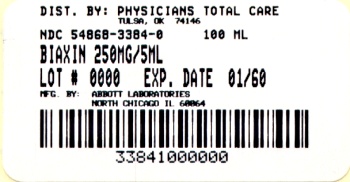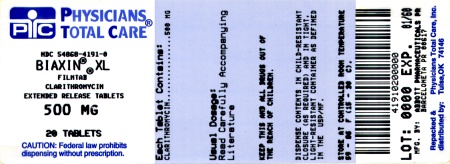For most of the drugs advantages of taking medications overweighs the potential risks however some drugs could be really dangerous for breastfed baby hence every medication shall be considered separately. In this page we will discuss about purpose of Biaxin | Clarithromycin Tablet and its risk associated with lactation. We will also discuss the usage of Biaxin | Clarithromycin Tablet and some common side effects associated with Biaxin | Clarithromycin Tablet.
What is Biaxin | Clarithromycin Tablet used for?
BIAXIN Filmtab (clarithromycin tablets, USP) and BIAXIN Granules (clarithromycin for oral suspension, USP) are indicated for the treatment of mild to moderate infections caused by susceptible strains of the designated microorganisms in the conditions as listed below: Adults (BIAXIN Filmtab Tablets and Granules for Oral Suspension) Pharyngitis/Tonsillitis due to Streptococcus pyogenes (The usual drug of choice in the treatment and prevention of streptococcal infections and the prophylaxis of rheumatic fever is penicillin administered by either the intramuscular or the oral route. Clarithromycin is generally effective in the eradication of S. pyogenes from the nasopharynx; however, data establishing the efficacy of clarithromycin in the subsequent prevention of rheumatic fever are not available at present). Acute maxillary sinusitis due to Haemophilus influenzae, Moraxella catarrhalis, or Streptococcus pneumoniae. Acute bacterial exacerbation of chronic bronchitis due to Haemophilus influenzae , Haemophilus parainfluenzae, Moraxella catarrhalis, or Streptococcus pneumoniae. Community-Acquired Pneumonia due to Haemophilus influenzae, Mycoplasma pneumoniae, Streptococcus pneumoniae, or Chlamydia pneumoniae (TWAR). Uncomplicated skin and skin structure infections due to Staphylococcus aureus , or Streptococcus pyogenes (Abscesses usually require surgical drainage). Disseminated mycobacterial infections due to Mycobacterium avium, or Mycobacterium intracellulare BIAXIN (clarithromycin) Filmtab tablets in combination with amoxicillin and PREVACID (lansoprazole) or PRILOSEC (omeprazole) Delayed-Release Capsules, as triple therapy, are indicated for the treatment of patients with H. pylori infection and duodenal ulcer disease (active or five-year history of duodenal ulcer) to eradicate H. pylori. BIAXIN Filmtab tablets in combination with PRILOSEC (omeprazole) capsules or TRITEC (ranitidine bismuth citrate) tablets are also indicated for the treatment of patients with an active duodenal ulcer associated with H. pylori infection. However, regimens which contain clarithromycin as the single antimicrobial agent are more likely to be associated with the development of clarithromycin resistance among patients who fail therapy. Clarithromycin-containing regimens should not be used in patients with known or suspected clarithromycin resistant isolates because the efficacy of treatment is reduced in this setting. In patients who fail therapy, susceptibility testing should be done if possible. If resistance to clarithromycin is demonstrated, a non-clarithromycin-containing therapy is recommended. (For information on development of resistance see Microbiology section.) The eradication of H. pylori has been demonstrated to reduce the risk of duodenal ulcer recurrence. Children (BIAXIN Filmtab Tablets and Granules for Oral Suspension) Pharyngitis/Tonsillitis due to Streptococcus pyogenes. Community-Acquired Pneumonia due to Mycoplasma pneumoniae, Streptococcus pneumoniae, or Chlamydia pneumoniae (TWAR) Acute maxillary sinusitis due to Haemophilus influenzae, Moraxella catarrhalis, or Streptococcus pneumoniae Acute otitis media due to Haemophilus influenzae, Moraxella catarrhalis, or Streptococcus pneumoniae NOTE: For information on otitis media, see CLINICAL STUDIES - Otitis Media. Uncomplicated skin and skin structure infections due to Staphylococcus aureus, or Streptococcus pyogenes (Abscesses usually require surgical drainage.) Disseminated mycobacterial infections due to Mycobacterium avium, or Mycobacterium intracellulare Adults (BIAXIN XL Filmtab Tablets) BIAXIN XL Filmtab (clarithromycin extended-release tablets) are indicated for the treatment of adults with mild to moderate infection caused by susceptible strains of the designated microorganisms in the conditions listed below: Acute maxillary sinusitis due to Haemophilus influenzae, Moraxella catarrhalis, or Streptococcus pneumoniae Acute bacterial exacerbation of chronic bronchitis due to Haemophilus influenzae, Haemophilus parainfluenzae, Moraxella catarrhalis, or Streptococcus pneumoniae Community-Acquired Pneumonia due to Haemophilus influenzae, Haemophilus parainfluenzae, Moraxella catarrhalis, Streptococcus pneumoniae, Chlamydia pneumoniae (TWAR), or Mycoplasma pneumoniae THE EFFICACY AND SAFETY OF BIAXIN XL IN TREATING OTHER INFECTIONS FOR WHICH OTHER FORMULATIONS OF BIAXIN ARE APPROVED HAVE NOT BEEN ESTABLISHED. Prophylaxis BIAXIN Filmtab tablets and BIAXIN Granules for oral suspension are indicated for the prevention of disseminated Mycobacterium avium complex (MAC) disease in patients with advanced HIV infection. To reduce the development of drug-resistant bacteria and maintain the effectiveness of BIAXIN and other antibacterial drugs, BIAXIN should be used only to treat or prevent infections that are proven or strongly suspected to be caused by susceptible bacteria. When culture and susceptibility information are available, they should be considered in selecting or modifying antibacterial therapy. In the absence of such data, local epidemiology and susceptibility patterns may contribute to the empiric selection of therapy.
I am breastfeeding mother and I am using Biaxin | Clarithromycin Tablet. Can it have any bad effect on my kid? Shall I search for better alternative?
Clarithromycin is the only one ingredient used in manufacturing of Biaxin | Clarithromycin Tablet, Which makes it easier to analyze its effect in breastfeeding. As per our analysis of Clarithromycin it is safe to use Biaxin | Clarithromycin Tablet while lactating. We suggest you to check further details below about Clarithromycin usage in breastfeeding.
Statement of Manufacturer/Labeler about breastfeeding usage
Nursing Mothers It is not known whether clarithromycin is excreted in human milk. Because many drugs are excreted in human milk, caution should be exercised when clarithromycin is administered to a nursing woman. It is known that clarithromycin is excreted in the milk of lactating animals and that other drugs of this class are excreted in human milk. Preweaned rats, exposed indirectly via consumption of milk from dams treated with 150 mg/kg/day for 3 weeks, were not adversely affected, despite data indicating higher drug levels in milk than in plasma.
Biaxin | Clarithromycin Tablet Breastfeeding Analsys
SafeCAS Number: 81103-11-9
It is not excreted in significant amount into breast milk . Commonly used for pediatric treatment which is very well tolerated. Erythromycin is a macrolide that has been related to hypertrophic pyloric stenosis with early exposition. Avoiding use in the first post-partum month would be advisable yet it may occurred while breastfeeding. Be aware of the possibility of false negative results of bacterial cultures when the mother is on antibiotics. Also, diarrheal disease due to imbalance of intestinal flora is possible.
Biaxin | Clarithromycin Tablet Breastfeeding Analsys - 2
CAS Number: 81103-11-9
Because of the low levels of clarithromycin in breastmilk and administration directly to infants, it is acceptable in nursing mothers. The small amounts in milk are unlikely to cause adverse effects in the infant. Monitor the infant for possible effects on the gastrointestinal flora, such as diarrhea, candidiasis (thrush, diaper rash). Unconfirmed epidemiologic evidence indicates that the risk of hypertrophic pyloric stenosis in infants might be increased by maternal use of macrolide antibiotics during breastfeeding.

What should I do if I am breastfeeding mother and I am already exposed to Biaxin | Clarithromycin Tablet?
Biaxin | Clarithromycin Tablet is safe in breastfeeding and should not create any health problem for your baby but in case you feel any health issue associated with Biaxin | Clarithromycin Tablet you should contact your doctor or health care provider. Be it pregnancy or lactation you shall keep your doctor informed.
I am nursing mother and my doctor has suggested me to use Biaxin | Clarithromycin Tablet, is it safe?
Definitely, Biaxin | Clarithromycin Tablet is safe in lactation for baby. No wonder your doctor has recommended it.
If I am using Biaxin | Clarithromycin Tablet, will my baby need extra monitoring?
No extra baby monitoring required while mother is using Biaxin | Clarithromycin Tablet
Who can I talk to if I have questions about usage of Biaxin | Clarithromycin Tablet in breastfeeding?
US
National Womens Health and Breastfeeding Helpline: 800-994-9662 (TDD 888-220-5446) 9 a.m. and 6 p.m. ET, Monday through Friday
UK
National Breastfeeding Helpline: 0300-100-0212 9.30am to 9.30pm, daily
Association of Breastfeeding Mothers: 0300-330-5453
La Leche League: 0345-120-2918
The Breastfeeding Network supporter line in Bengali and Sylheti: 0300-456-2421
National Childbirth Trust (NCT): 0300-330-0700
Australia
National Breastfeeding Helpline: 1800-686-268 24 hours a day, 7 days a week
Canada
Telehealth Ontario for breastfeeding: 1-866-797-0000 24 hours a day, 7 days a week
Drug Brands with same Active ingredients



